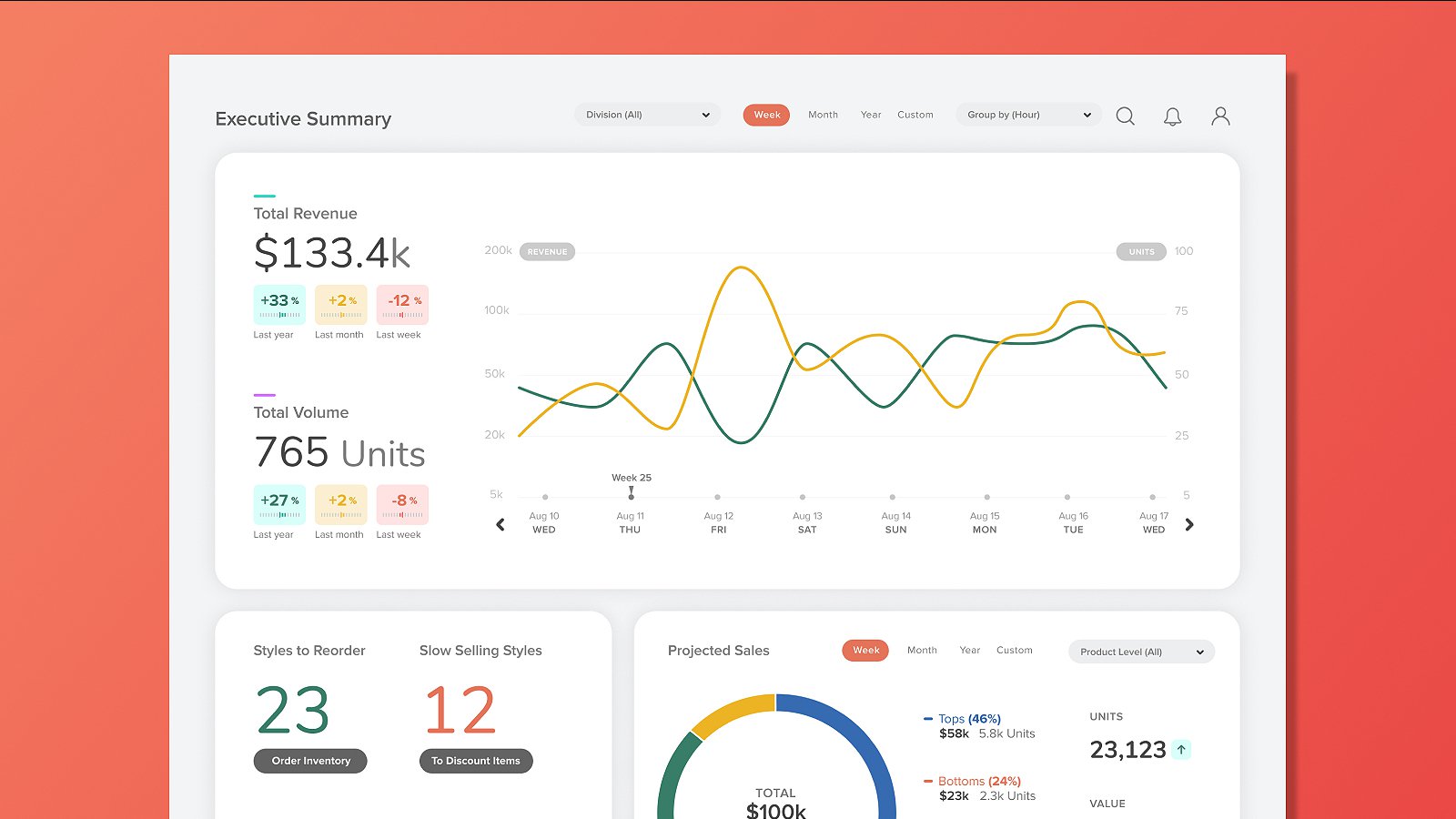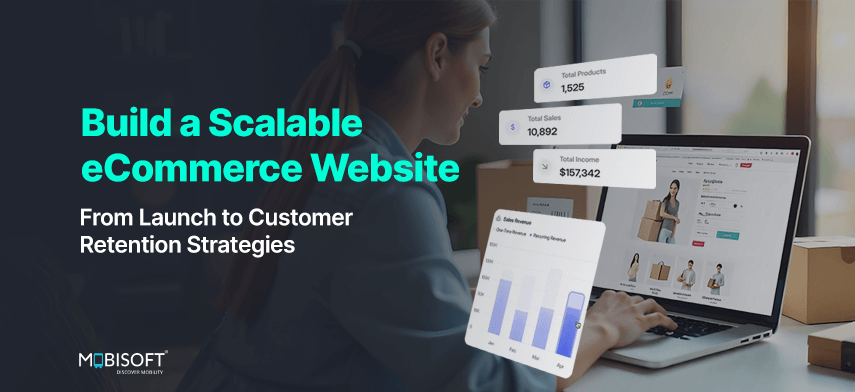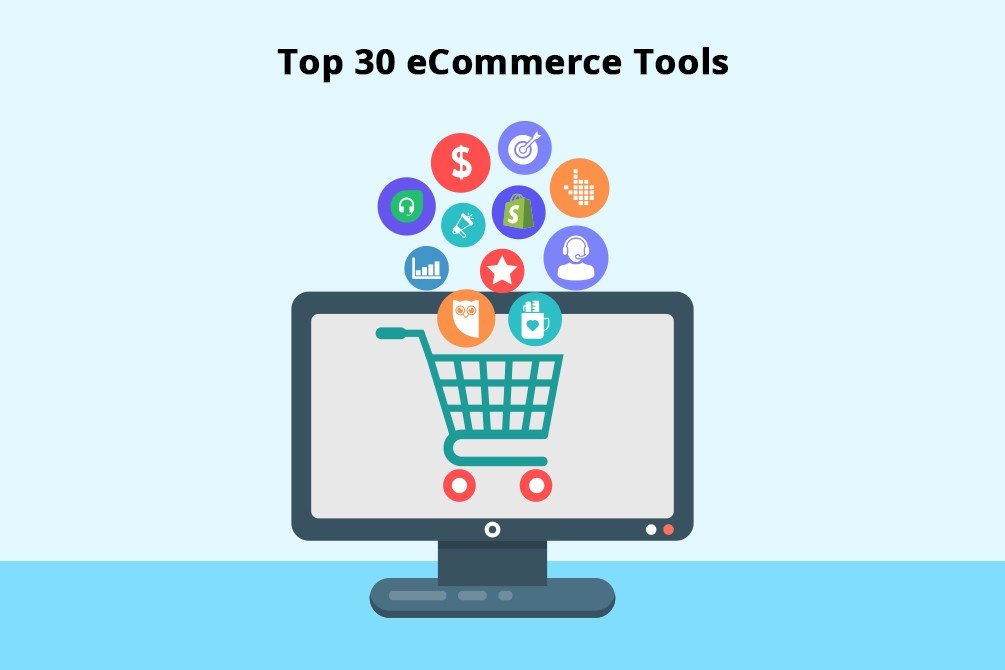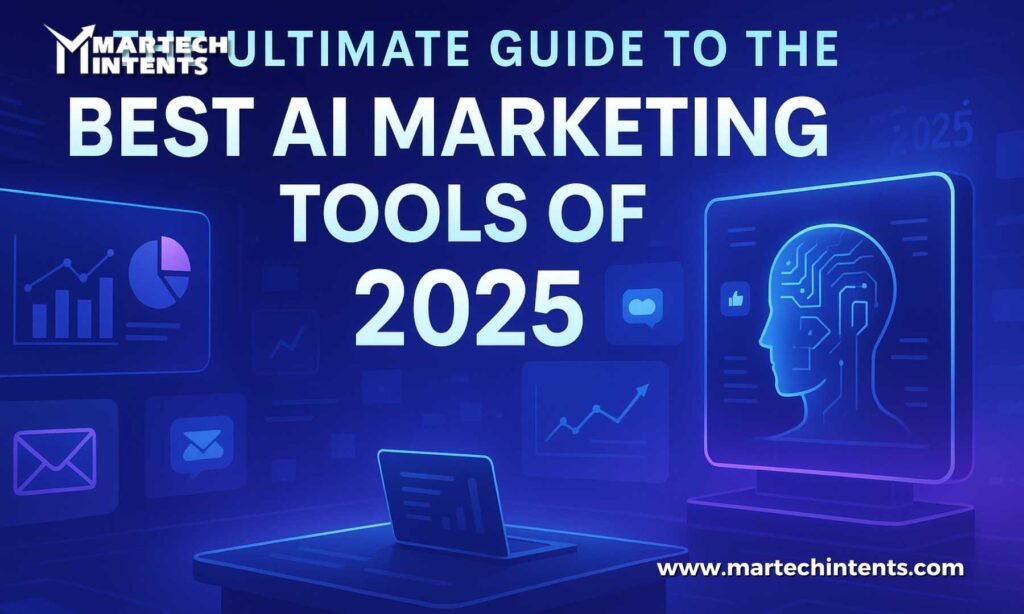Are you ready to take your online store to the next level? Imagine turning casual browsers into loyal customers, effortlessly managing your operations, and watching your sales skyrocket.
Sounds like a dream, right? With the right ecommerce marketing tools, this dream can become your reality. These tools are not just about making your life easier—they are about transforming how you do business. By focusing on conversion optimization, automation, analytics, and omnichannel selling, you can create a seamless shopping experience that keeps your customers coming back for more.
Stay with us as we dive into the essential tools you need to grow your online store effectively. Whether you’re looking to streamline your inventory management, enhance your checkout process, or boost your marketing efforts with email and SMS campaigns, we’ve got you covered. You’ll discover how smart analytics can supercharge your conversions and how social media integrations can expand your reach. Plus, we’ll guide you in choosing the best tools to fit your unique ecommerce needs. Ready to revolutionize your online business? Let’s get started!

Credit: www.mayple.com
Why Ecommerce Marketing Tools Are Essential
Ecommerce marketing tools boost your online store’s growth. They enhance conversion rates, automate tasks, and provide valuable analytics. These tools also support omnichannel selling, ensuring a seamless customer experience across platforms.
In today’s digital world, having the right tools is crucial for online store success. Ecommerce marketing tools help businesses grow by optimizing conversions, automating tasks, and more. These tools ensure stores reach their full potential. Enhancing Conversion Rates Conversion rates are vital for any online store.
Without them, sales won’t happen. Tools that focus on conversion optimization make this easier: – Heatmaps: Visual representation of user interaction on your site. – A/B Testing: Testing different versions of a page to see which performs better. – Exit-Intent Popups: Capturing attention before a visitor leaves your site.
Streamlining Automation Automation tools save time and effort. They allow businesses to focus on growth: – Email Marketing Automation: Sends personalized emails based on user behavior. – Social Media Scheduling: Pre-schedules posts across various platforms. – Inventory Management: Automatically updates stock levels as sales happen.
Enhancing Analytics Understanding data is key to making informed decisions. Analytics tools provide insights: – Real-Time Reporting: See live data and trends as they happen. – Customer Segmentation: Divide your audience into groups based on behavior. – Sales Funnel Analysis: Understand the journey from visitor to customer.
Supporting Omnichannel Selling Reaching customers on multiple platforms is essential. Omnichannel tools make this seamless: – Centralized Order Management: Track orders from all sales channels in one place. – Multi-Channel Inventory Sync: Keeps stock levels consistent across platforms. – Unified Customer Experience: Provides a consistent experience, whether online or offline.
These tools equip businesses to thrive in a competitive market. They are essential for any online store aiming to grow effectively.
Key Features To Grow Your Online Store
Boost your online store with top ecommerce tools. Optimize conversions, automate tasks, and analyze data effortlessly. Sell across channels for effective growth.
Growing your online store can feel like a complex puzzle. Thankfully, ecommerce marketing tools help simplify the process. They offer features that can enhance your store’s performance and increase sales. Let’s explore some key attributes that these tools provide. Conversion Optimization Features Boosting conversions is crucial for any online store.
Conversion optimization tools offer several features to aid this: – A/B Testing: Allows comparing different versions of your webpage to find the best-performing one. – Heatmaps: Visual representations show where users click, helping to optimize layout. – Exit Intent Popups: Engage visitors with offers before they leave your site.
Automation Capabilities Automation saves time and increases efficiency. It’s like having a virtual assistant for repetitive tasks: – Email Marketing Automation: Sends personalized emails based on user behavior. – Social Media Scheduling: Plans and posts on social channels automatically. – Cart Abandonment Alerts: Notifies users to remind them of items left in their cart.
Analytics Tools Understanding your store’s data is vital for growth. Analytics tools provide valuable insights: Analytics tools offer insights into your store’s performance. They help in making informed decisions by providing data on user behavior, sales trends, and more. This information is crucial to adapting your strategies and improving your store’s success.
Omnichannel Selling Options Selling across multiple channels can expand your reach. Omnichannel tools streamline this process: – Inventory Management: Keeps track of stock across different selling platforms. – Unified Customer Experience: Ensures consistent interaction across all channels. – Cross-Channel Promotions: Allows seamless promotions across various platforms.
These features empower you to grow your online store effectively. With the right tools, managing your ecommerce business becomes easier and more efficient.
Top Ecommerce Tools On Appsumo
Explore AppSumo’s top ecommerce tools designed for boosting conversion rates and streamlining automation. Enhance analytics insights and manage omnichannel sales to grow your online store smoothly. Discover effective solutions to optimize marketing strategies without complexity.
Exploring the vast landscape of ecommerce tools can be daunting. AppSumo offers a diverse range of solutions tailored for online stores. These tools are vital for boosting conversions, streamlining operations, and enhancing customer experiences. Let’s delve into some top picks available on AppSumo.
Sellfy Sellfy simplifies the process of selling digital products. It caters to creators and small businesses. – Customizable storefronts: Allow businesses to brand their online presence. – Easy payment integration: Supports major payment gateways for seamless transactions. – Marketing tools: Includes features like discount codes and email marketing.
SendFox SendFox is perfect for email marketing. It helps businesses communicate effectively with customers. – Automated email campaigns: Schedule emails to engage with subscribers regularly. – List management: Organize subscribers to tailor messages and offers. – Analytics dashboard: Provides insights into email performance and engagement.
TidyCal TidyCal streamlines appointment scheduling. It’s ideal for businesses needing efficient booking solutions. – Customizable booking pages: Businesses can tailor pages to fit their brand. – Integration with calendars: Syncs with Google and other calendar services. – Payment options: Allows users to charge for appointments if needed.
KingSumo KingSumo focuses on growing email lists through viral giveaways. It’s a tool for boosting brand awareness. – Easy setup: Create and launch giveaways quickly. – Social sharing options: Encourage participants to share for more entries. – Data collection: Gather valuable insights from participants.
Pabbly Connect Pabbly Connect automates workflows across apps. It saves time by reducing manual tasks. – Integration with multiple apps: Connects over 400 apps for streamlined operations. – Trigger-based actions: Set actions based on specific events or conditions. – User-friendly interface: Simplifies the process of creating automation workflows.
Missinglettr Missinglettr automates social media posting. It’s designed for businesses looking to maintain an active online presence. – Drip campaigns: Schedule posts over time to keep content fresh. – Content library: Store posts for future use and easy access. – Analytics tools: Measure the effectiveness of social media campaigns.
Book Like A Boss Book Like A Boss offers a comprehensive booking platform. It’s suitable for service-based businesses. – Branded booking pages: Customize pages to reflect business identity. – Multiple service options: Offer different booking types and packages. – Customer communication: Send reminders and follow-ups to clients.
These tools from AppSumo can significantly aid ecommerce businesses. Each offers unique features to streamline processes and enhance customer interactions.
Tools For Inventory
Explore top ecommerce marketing tools for inventory management, boosting conversion rates, and streamlining automation. Enhance analytics and leverage omnichannel selling to effectively grow your online store.
Managing inventory is crucial for any eCommerce store. Without the right tools, it can become overwhelming. Fortunately, there are excellent tools designed to streamline this process. Let’s explore some of the top options available. Inventory Management Software Efficient inventory management software can make or break your business.
The right tool helps maintain optimal stock levels, preventing overselling or stockouts. – Real-time tracking: Keep track of inventory levels in real-time. – Automated updates: Receive automatic updates when stock levels change. – Centralized system: Manage inventory from a single platform.
– Forecasting tools: Anticipate future demand and adjust stock accordingly. Warehouse Management Systems Warehouse management systems (WMS) are essential for larger operations. They help organize the storage and movement of products within a warehouse. A good WMS offers various features: – Layout optimization: Improve warehouse layout for better efficiency.
– Order tracking: Monitor orders from receipt to shipment. – Barcode scanning: Use barcodes for quick and accurate inventory checks. – Labor management: Efficiently allocate tasks to warehouse staff. Dropshipping Tools Dropshipping eliminates the need to hold inventory. Instead, products are shipped directly from suppliers to customers.
Several tools can enhance your dropshipping experience: – Supplier integration: Connect with suppliers for seamless transactions. – Product importation: Easily import products to your store. – Order automation: Automate the order fulfillment process. – Pricing tools: Adjust pricing based on supplier costs and market trends.
Inventory Alerts and Notifications Inventory alerts keep you informed about critical stock changes. These alerts ensure you never run out of popular items. – Low stock alerts: Receive notifications when stock levels drop too low. – Reorder reminders: Get alerts to reorder before stock runs out.
– Sales trends: Track sales patterns to anticipate inventory needs. – Customizable settings: Tailor alerts to suit your specific requirements. Utilizing these tools can greatly simplify inventory management. Each tool offers unique features tailored to different business needs. Choose wisely to enhance efficiency and grow your online store.
Checkout
Explore top ecommerce marketing tools for boosting conversions, automating tasks, analyzing data, and enhancing omnichannel sales. These tools help grow your online store efficiently. Streamline operations and maximize potential with effective strategies.
In the world of ecommerce, the checkout process plays a crucial role. It can make or break a sale. With the right tools, you can streamline the process and boost conversions. This section will guide you through the top tools for optimizing your checkout experience.
Simplified Process A smooth checkout process encourages customers to complete their purchase. Consider these tools to simplify the steps: – One-click checkout solutions: Reduce the number of steps needed to complete a purchase. – Autofill features: Automatically fill in customer details to save time.
– Guest checkout options: Allow customers to buy without creating an account. Mobile-Friendly Checkout A growing number of shoppers use mobile devices. Ensure your checkout process is mobile-friendly. Here’s how: Responsive design is key. Your checkout page should adjust to any screen size.
Use large buttons and easy-to-read fonts. This minimizes frustration on small screens. Payment methods should be mobile-optimized too. Enable Apple Pay and Google Wallet options. Secure Payment Gateways Security is a top concern for online shoppers. Using secure payment gateways is essential: – SSL certificates: Encrypt customer data for secure transactions.
– Trusted payment options: Offer reliable methods like PayPal or Stripe. – Fraud detection tools: Monitor transactions for suspicious activity. Abandoned Cart Recovery Sometimes, customers leave items in their cart. Use tools to bring them back: Automated email reminders can nudge customers to complete their purchase.
Include a discount code to entice them. Retargeting ads can also remind them of their cart. These ads appear on other sites they visit. Personalized Checkout Experience A personalized experience can improve conversion rates. Use data to tailor the checkout process: – Personalized product recommendations: Suggest items based on past purchases.
– Custom greetings: Address customers by name for a personal touch. – Tailored discounts: Offer exclusive deals based on shopping behavior. Multi-Currency Support If you sell internationally, support multiple currencies. This makes purchasing easier for global customers: Dynamic currency conversion allows customers to view prices in their local currency.
Clearly display exchange rates and fees. This transparency builds trust. Ensure your payment gateway supports international transactions. Post-Purchase Engagement After checkout, keep the conversation going. Engage customers to encourage future purchases: Thank-you pages are a great start. Offer a discount on their next purchase.
Request feedback to improve your service. Email follow-ups can also suggest related products. This keeps your brand top-of-mind.
And Payments
Explore essential ecommerce tools to boost conversion, automate tasks, and analyze data. Enhance your online store’s growth with effective omnichannel selling strategies. Improve payment systems to streamline customer transactions.
Navigating the world of ecommerce can be complex, especially with so many tools available for growth. To succeed, focusing on payments is crucial. By choosing the right payment solutions, you can enhance customer experience and boost sales. Here’s a closer look at some essential tools to consider.
Payment Gateways Choosing a reliable payment gateway is vital. It ensures smooth transactions and secure data handling. Here’s what to look for: – Compatibility: Works seamlessly with your ecommerce platform. – Security: Protects customer data with encryption. – Fees: Understand transaction costs and monthly charges.
– Customer Support: Offers 24/7 assistance for issues. – Multi-currency Support: Accepts various currencies for global sales. Mobile Payments Mobile payments are increasingly popular. They offer convenience and speed for shoppers on the go. Consider these factors: – User Experience: Easy to use on smartphones and tablets.
– Security: Secure authentication to prevent fraud. – Popular Platforms: Supports Google Pay, Apple Pay, etc. – Integration: Easily integrates with existing systems. – Speed: Fast transaction processing. Subscription Billing Subscription models are growing in ecommerce. They provide recurring revenue and build customer loyalty.
Key features include: – Flexible Plans: Offer various subscription options. – Automated Billing: Automatically charges customers at intervals. – Customer Management: Tools for handling changes or cancellations. – Analytics: Insights into subscriber behavior and trends. – Payment Methods: Accepts multiple forms of payment.
Fraud Prevention Tools Fraud can be a significant concern in ecommerce. Implementing fraud prevention tools is essential. Here’s what they offer: – Real-Time Monitoring: Detects suspicious activities immediately. – Machine Learning: Analyzes patterns to identify fraud. – Chargeback Management: Helps manage and reduce chargebacks.
– Authentication: Multi-layered security for transactions. – Reports: Provides detailed insights on fraud attempts. Understanding these payment aspects can set your ecommerce store on the path to success. By integrating these tools, you can ensure a smooth, secure, and user-friendly experience for all customers.
Boosting Conversions With Smart Analytics
Smart analytics enhance conversions, offering essential ecommerce tools for optimization, automation, and omnichannel selling. Grow your online store effectively through insightful analytics and strategic marketing.
In the fast-paced world of e-commerce, understanding customer behavior is vital. Smart analytics tools can transform data into insights. These insights help online stores enhance conversions and grow effectively. Let’s delve into how these tools can make a difference. Understanding Customer Behavior Knowing what customers want is key.
Analytics tools provide this understanding. They track user actions on your site. This data tells you what’s working and what’s not. Identifying High-Performing Products Some products sell better than others. Analytics tools can identify these products. Here’s how they help: – Sales Trends: Track which items sell consistently well.
– Customer Preferences: Understand which features attract buyers. – Inventory Management: Plan stock based on demand data. Enhancing User Experience A smooth user experience boosts conversions. Analytics tools help you improve it. They highlight areas needing attention. Reducing Cart Abandonment Cart abandonment is a challenge.
Analytics tools offer solutions. They provide insights into why users leave without buying. Optimizing Marketing Campaigns Effective marketing increases sales. Analytics tools refine these campaigns. They show which strategies work best. Measuring Conversion Rates Knowing your conversion rate is crucial.
Analytics tools calculate this for you. They provide detailed reports to guide improvements. A/B Testing for Better Results Testing different strategies improves results. Analytics tools support A/B testing. They help you compare outcomes to choose the best approach.
Email And Sms Marketing For Ecommerce
Explore effective email and SMS marketing strategies for ecommerce. Boost your online store with top tools for conversion optimization and automation. Enhance analytics and omnichannel selling to grow your business efficiently.
In the world of ecommerce, reaching customers effectively is key. Email and SMS marketing stand out as direct and personal ways to engage buyers. These tools have evolved, allowing businesses to tailor messages and drive conversions seamlessly. Understanding their impact can elevate your marketing game.
Importance of Email Marketing Email marketing remains a staple for reaching online shoppers. It offers a direct line to customers’ inboxes, allowing businesses to share updates, promotions, and news. Moreover, it provides a cost-effective way to nurture relationships with potential buyers.
– Personalization: Tailor messages based on customer behavior and preferences. – Automation: Send timely emails without manual effort. – Tracking: Monitor open rates, clicks, and conversions. Benefits of SMS Marketing SMS marketing offers a fast and direct way to reach customers.
With high open rates, it ensures your message is seen promptly. This channel is perfect for time-sensitive offers and quick updates. – Immediate Delivery: Messages are received in seconds. – High Engagement: People tend to read texts quickly. – Short and Sweet: Concise messages are easy to digest.
Integrating Email and SMS for Better Results Combining email and SMS can enhance your marketing strategy. Each channel complements the other, creating a cohesive experience for customers. – Unified Campaigns: Use both channels for consistent messaging. – Cross-Promotion: Share links between email and SMS for added reach.
– Segmentation: Target different audiences with tailored messages. Choosing the Right Platforms Selecting the right tools for email and SMS marketing is crucial. Many platforms offer robust features to streamline your efforts. Consider your needs and budget when choosing a solution.
– Ease of Use: Look for user-friendly interfaces. – Integration: Ensure compatibility with your ecommerce platform. – Support: Opt for platforms with reliable customer service.
Social Media Integrations For Online Stores
Explore top ecommerce tools to boost your store’s success. Enhance conversion, automate tasks, and analyze data efficiently. Achieve seamless omnichannel selling for effective growth.
Social media is essential for online stores. It connects brands with customers. Integrating social platforms helps boost sales and engagement. Let’s explore how these integrations benefit your store. Enhanced Customer Engagement Social media integrations allow stores to connect with customers directly.
This interaction builds trust and increases brand loyalty. Customers feel valued when they receive quick responses. Engaging content on social media also encourages sharing. This can expand your reach and attract new customers. Streamlined Social Shopping Using social media for shopping is convenient.
Here are some benefits: – Seamless Experience: Customers can shop directly on social platforms. – Wider Audience: Reach more potential buyers through social channels. – Quick Purchases: Minimize steps for customers to buy products. – Increased Visibility: Products gain more exposure on social feeds.
Real-Time Analytics Social media integrations provide valuable insights. They show how customers interact with your store. Track engagement, likes, shares, and comments. Use this data to improve your marketing strategy. Understanding your audience helps tailor content to their needs. Unified Brand Presence A consistent brand image is vital.
Social media integrations help maintain this across platforms. Your store can showcase products in a unified way. Consistency builds trust and recognition. Keep your brand message clear and engaging for your audience. Simplified Content Scheduling Scheduling content becomes easier with integrations.
Let’s look at the advantages: – Time Management: Plan and schedule posts in advance. – Consistent Updates: Regularly update followers with new content. – Cross-Platform Posting: Share content across multiple platforms simultaneously. – Engagement Tracking: Monitor post performance and adjust strategies.
Choosing The Best Tools For Your Ecommerce Stack
Discover top ecommerce marketing tools that boost conversion optimization and automation. Enhance your store with analytics and omnichannel selling. Grow your online store effectively.
Selecting the right tools for your ecommerce stack can make or break your success. With so many options, it’s easy to feel overwhelmed. This section will help you narrow down your choices. Focus on tools that boost efficiency and improve customer experience.
Let’s explore key categories to consider for your online store. Conversion Optimization Tools Enhancing your conversion rate is crucial for ecommerce growth. These tools help turn visitors into customers. – A/B Testing: Test different versions of your site to see which performs best.
– Heatmaps: Visualize where users click and scroll on your site. – Exit-Intent Popups: Capture visitors before they leave with timely offers. Automation Tools Managing an online store involves many repetitive tasks. Automation tools can streamline these processes. – Email Marketing Automation: Send personalized emails based on user behavior.
– Inventory Management: Automate stock updates and alerts. – Chatbots: Provide instant customer support without human intervention. Analytics Tools Understand your store’s performance with insightful data. Analytics tools provide the metrics you need. Collect data on your site’s traffic and user behavior.
Analyze this information to make informed decisions. – Website Analytics: Track visitors, sessions, and bounce rates. – Customer Insights: Understand demographics and purchase patterns. – Sales Reporting: Monitor revenue and identify trends. Omnichannel Selling Tools Reach customers across multiple platforms for a seamless experience.
These tools help unify your sales channels. – Unified Inventory: Sync stock levels across online and offline channels. – Multi-Channel Order Management: Handle orders from various platforms in one place. – Consistent Branding: Ensure your brand message is uniform across channels.

Credit: mobisoftinfotech.com
Frequently Asked Questions
Why Are Ecommerce Marketing Tools Essential?
Ecommerce marketing tools are crucial for optimizing conversions and automating tasks. They provide analytics for data-driven decisions, enhancing your store’s efficiency. With omnichannel capabilities, they streamline selling across platforms, ensuring a seamless customer experience. These tools empower growth, helping online businesses stay competitive and responsive in a fast-evolving market.
What Key Features Grow Your Online Store?
Key features include conversion optimization, automation, and analytics. They help in understanding customer behavior and improving marketing strategies. Omnichannel selling ensures a consistent customer experience across platforms. Together, these features enhance operational efficiency, boost sales, and drive business growth, enabling stores to thrive in the competitive ecommerce landscape.
How Do Smart Analytics Boost Conversions?
Smart analytics provide insights into customer behavior and preferences. They enable data-driven decisions to improve marketing strategies. By identifying trends and areas for improvement, analytics optimize conversion rates. They also help in targeting the right audience, enhancing engagement, and driving more sales, ultimately boosting the store’s profitability.
Why Integrate Social Media With Online Stores?
Integrating social media with online stores enhances visibility and engagement. It allows direct interaction with customers and promotes products effectively. Social platforms drive traffic to your store, increasing potential sales. By leveraging social media, you tap into a larger audience, fostering brand loyalty and expanding your market reach.
Conclusion
Explore the right tools to boost your online store’s growth. Harness conversion optimization for higher sales. Automate processes to save time and reduce errors. Use analytics to understand customer behavior. Implement omnichannel selling to reach more customers. Each tool offers unique benefits.
Choose wisely based on your store’s needs. Improve inventory management, checkout, and payments. Enhance customer engagement with email and SMS marketing. Use social media for broader visibility. A balanced ecommerce stack is key. Stay updated with tools from platforms like AppSumo.
Equip your store to thrive in the competitive ecommerce market.



